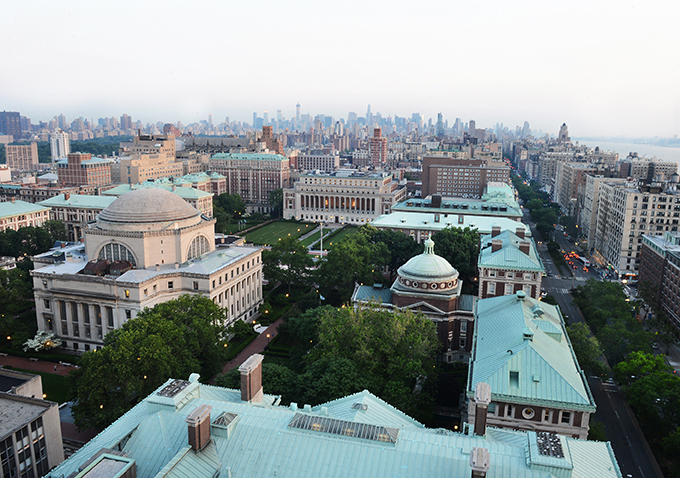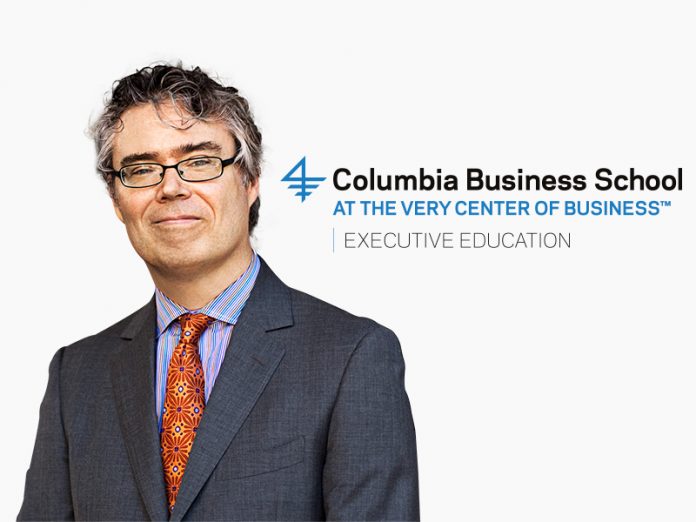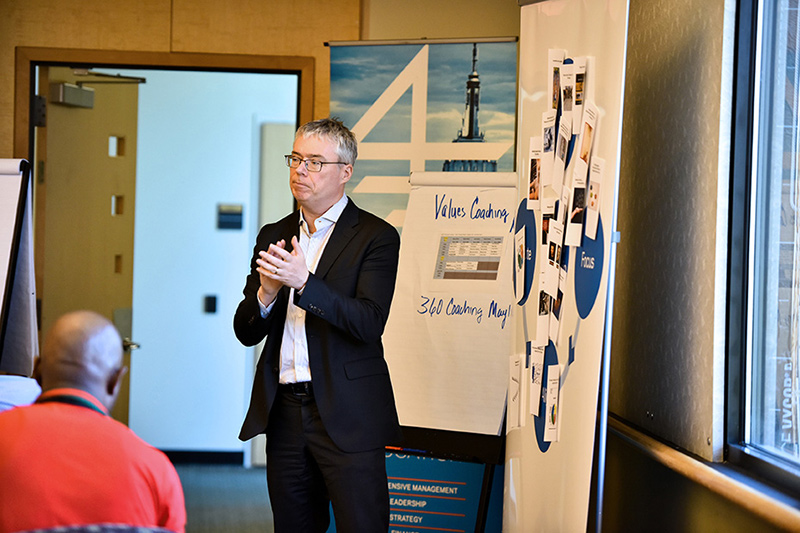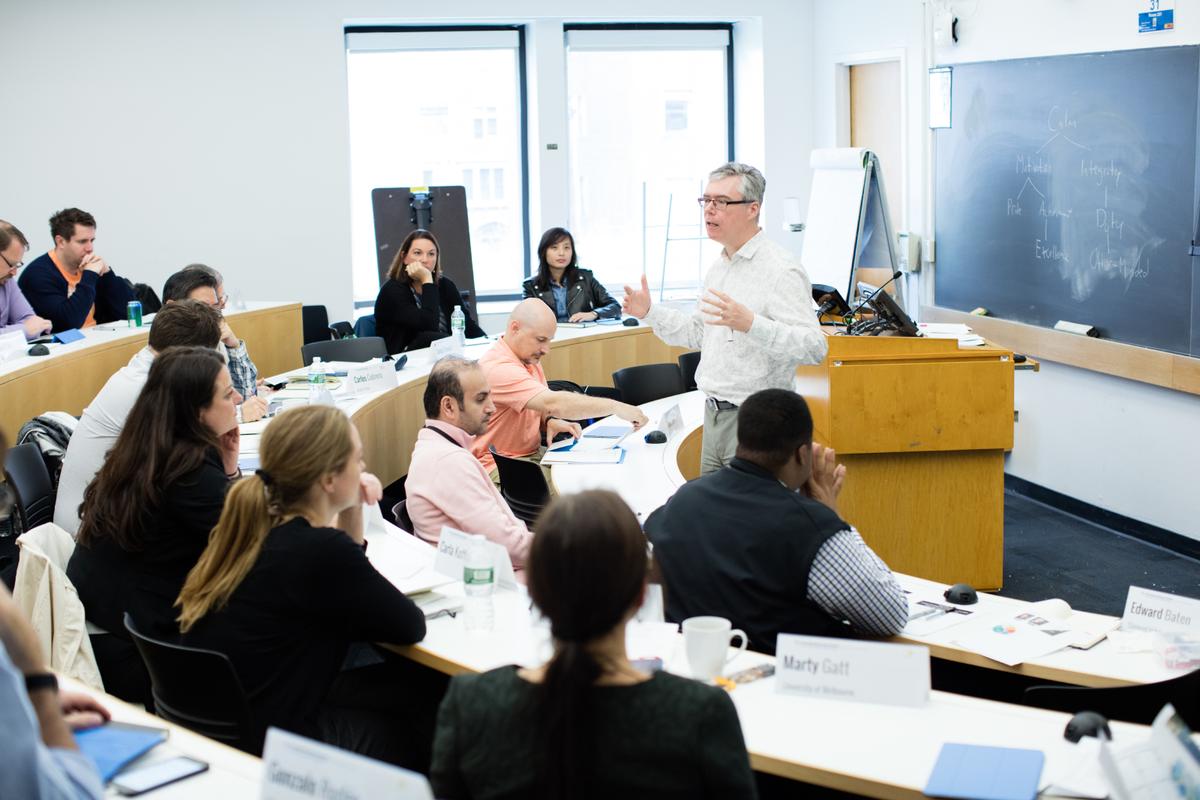Interview with Professor Paul Ingram, Faculty Director of Advanced Management Programme from Columbia Business School Executive Education
Located in one of the world’s most dynamic business hubs – New York City, Columbia Business School Executive Education has an unparalleled environment for advanced business education. To find out how it allows executives to immerse themselves in NYC’s rich culture and vigorous business scenes, we sat down with Professor Paul Ingram, Faculty Director of Columbia Business School Executive Education’s Advanced Management Programme, who sheds light on their uniquely designed curriculum and the proven learning methodology that help executives respond to evolving leadership challenges and create a vision to lead their companies to success.
Good day, Professor Ingram! Thank you for taking the time to talk to us today. Let’s start this interview by giving us a glimpse of what a day looks like for an academic leader like you?
I spend a large portion of my time teaching, so most days, I’m in the classroom – or teaching in other locations. Yesterday, I taught a group of associates at a global law firm; today, I’ll be in meetings about a new way to bring leadership tools online. This evening, I’ll be travelling to Morocco where I’m teaching Executive MBA students as part of a great partnership programme that Columbia Business School runs with the African Business School. And I’m a scholar, so ideally there’s also time for some research, maybe some analysis of data and some writing, which is how I like to spend the extra hours that I can eek out.
Having held visiting professorships in various parts of the world, can you tell us the most significant development in the business world you’ve witnessed thus far? How about the next big thing in business / leadership education?
In a sense, we’re seeing a form of globalisation. I’ll start by pointing to China, where I’ve taught for close to 20 years. In the past, Chinese organisations were managed differently from what we would see in other regions of the world. Now the leaders that we teach from China are tapping into a lot of the universals about effectiveness of managing yourself, managing teams, and structuring organisations while dealing with their own culture and their own strategies. We’re also seeing some of the same leadership strategies in some countries in Africa. In a sense, human performance – individually and in teams – is becoming a kind of universal ideal. This means that we get to interact more and more with leaders in different kinds of organisations in different places.
As the Faculty Director of the Columbia Advanced Management Programme, what excites you most or what do you eagerly anticipate in terms of the programme’s present and future endeavours?
In every programme, there will be some incredible people. The participant pool is incredibly diverse, and I can rely on the fact that it is going to have a massive impact on me, just as it does on everybody else in the programme.
Another aspect that excites me about the Advanced Management Programme is that we’re always innovating in the programme. While we have a core pedagogy, we’re always looking to incorporate new content and ways to take the content to the next level and deliver it in more unique, differentiating and impactful ways. It’s exciting to be part of something that is continuously evolving.
Columbia Business School is known for being strategically positioned at the very center of business in various aspects, and the Advanced Management Programme is Columbia’s flagship residential programme for senior executives. Can you tell us more about what sets this particular programme apart from other executive education courses?
I don’t think there’s another executive education programme in the world like ours. Our programme is different from the other Advanced Management Programmes at other universities.
We’re dedicated to experiential learning where the participants are actually doing things as a way of learning. We may have a presentation of important new research, a case study, or a framework, but every day the participants are going to be putting ideas into action, trying them out in unique ways.
For doing that, we have New York City as our laboratory. We will learn about presence on the stage of a Broadway theatre. We’ll learn about new organisational designs with a startup company. We will learn about shaping culture in one of the world’s great museums. We’ll learn about teamwork in a jazz club interacting with a jazz band. These are ways to delver a lesson that you can’t get any other way – and the learnings stick. That’s the pedagogy and the methodology.
Then we aim the content of the programme at what’s most important to the senior executives who have joined us, which is strategy and leadership. We may have a session that touches on the latest ideas from branding or consumer behaviour, but it’s different – and designed differently – from what an MBA student might learn in a marketing class. It’s designed for a leader of an organisation, a potential Executive Director or CEO, through the lense of what they need to know about using these ideas strategically.
Your programme curriculum has been regarded as “eye-opening,” “empowering,” and “transformational” by your participants. Can you tell us more about the unique design of the Advanced Management Programme?
We have a programme that ran around 60 years ago, and it’s changed constantly over time. The changes are intentional improvements, thinking about the programme design in a very conscious way. It’s not just pieced together. Instead, we have a real arc of learning.
There are three phases. First, we excite participants about the potential of the programme – it’s a once-in-a-lifetime opportunity and a chance to do something great. We introduce them to new learning habits and processes and we set the foundation for what will best allow them to seize this opportunity.
Next, we stretch and challenge them. They’re doing exercises in teams that they never thought that they could do before. They’re building a network which is helping them in the programme, but will also support them for the rest of their careers.
Finally, we prepare them to take this great experience forward to their organisations and their careers. This is where they’re actually applying ideas to challenges in their organisations and where they’re thinking about how they’re going to tap into resources in their class at Columbia to continue their improvements that seem most important for them.
How do you make sure that the participants and their organisations will gain the highest return on their investment in terms of knowledge acquisition, career advancement, long-term profitability for business, and other measures of ROI for an executive education?
Based on research and decades of experience, our programme has a system for helping participants extract learnings and think about how they’re going to apply them. Research has confirmed how important 20 or 30 minutes for reflection at the end of a programme day are to the long-term impact of ideas. It’s now a proven practice for learning, but we were ahead of the curve with how carefully we attend to helping the participants with this reflection.
We also think about every element of the programme in terms of its return on investment. We are a unique programme that has actually measured that systemically. We’ve done pre- and post-programme tests on the leaders’ capability, and we’ve demonstrated that they have improved in the course of the programme.
What approach do you take to equip executives with the knowledge they need to immediately and effectively respond to their respective challenges?
We actually build their challenges from work into the programme. Participants bring a “Living Case,” a current business challenge they are facing, and apply ideas from the programme with the help of coaching from their peers and faculty to their challenge in real time. They receive feedback on themselves as leaders from the people they’re working with on the job, and – with a lot of support – develop a plan of improvement and constant learning in the ways that are most important for them individually as leaders. During or immediately after every session, we give participants the space to think about taking these ideas back to their workplace.
What’s the most challenging when addressing the needs of your participants? And how do you meet their expectations?
The biggest challenge is the biggest opportunity: diversity. The participants in the programme are all highly experienced and capable leaders, but they’re diverse in terms of the countries they’re coming from, their backgrounds, the industries which they work in, the organisations they lead or serve, and the paths their careers have taken.
This creates challenges of understanding and communication. They have to find ways to relate their organisations to each others’ so they can share learnings that cross between an insurance company in Nigeria, for example, and a financial services firm in the UK.
During the first few days of the programme, a lot of time is spent bumping into each other as they’re encountering these differences. But then there’s a shift. It usually happens by the end of the first week after we’ve given people with different perspectives the opportunity to shine and add value. People start to say, “The first day of the programme, I couldn’t have anticipated how I would have learned from this person sitting next to me. And now I can’t believe the lessons I’m taking back to my business from them.”
This is almost guaranteed to happen, by design, because if you really want to be an effective senior leader, you must look outside your company, your country, your industry, your area of functional expertise and by seeking out learnings and lessons from unexpected places. The diversity in our class is an incredible resource for this.
Over the years, the Advanced Management Programme has created positive impact on leadership development and bottom lines results. What have been the remarkable achievements and best feedback that you have received?
We see careers go in incredible directions. People go on to be CEOs of global organisations and affect the world in ways that they were only dreaming of when they were in the programme. That’s of course very satisfying. But that’s what the programme is designed to do.
What is most satisfying for me is when we get personal recommendations, often across generations of leaders. When people in the class say, “Look, I’m here because I know so-and-so who was in your programme five years ago, 10 years ago, sometimes even 20 years ago. They said it changed their life, and they said I have to do the same.”
One of your current research projects focuses on the structure and efficacy of managers’ professional networks. Can you share with us your research findings so far? And what is your advice for participants of the Advanced Management Programme in terms of network development?
That’s a research topic I’ve studied for a career. We have evidence that your set of professional relationships impacts the bottom line, your capacity to get things done, your access to ideas, your advancement in your career, and the efficacy in the performance of your organisation.
What I’ve been working on uniquely is the navigation between the idea that we get economic benefits from our relationships and at the same time have a drive that if there’s something that we call a personal relationship or friendship, it should be authentic. That it really should be personal, and it can’t simply be somebody who fits the box in terms of the kind of knowledge or help you need and therefore they become part of your network.
How do you navigate between the fact that these are social relationships, but they have economic interests? I have been looking at how leaders navigate this, and the conclusion I have reached is that economically useful network relationships are also authentic – socially and personally. Leaders can’t look around the world and say, “This person would be useful, so I’m going to add them to my network.” Instead, you have to go around the world, build authentic connections to the places you’re going to make investments to reach your professional goals.
But your sincerity, your authenticity, the personal connection actually is the foundation for an effective network. In the Advanced Management Programme, we examine and teach practical ways based on research of helping leaders do this. We help them understand their values, what they really stand for as a leader, and how to express that to others.
What do you think are the important qualities a business leader must have in order to drive organisations successfully into the future?
I think the two qualities that are defining successful leaders at this moment are a capacity for ongoing learning and the ability to lead cultures.
Learning, because business is evolving and organisations are only going to be more dynamic in the future. From the Advanced Management Programme, the executives who have been the most successful over time have been great learners. Of course, we try to cultivate learning, but there’s also the intrinsic capacity like their curiosity or their openness that they bring with them.
Then there’s the capacity to lead cultures. Culture and strategy are the defining inputs, the differentiators, that determine whether organisations succeed or fail. They’re both critically important, however strategy is easier to learn. And while leading the culture is learnable, it’s also an art that takes practice. It takes looking at examples, understanding yourself, and probably some painful failures. It’s the rarer skill, and I think the best leaders of the next generation are going to be great learners who will be artful leaders of the culture.
How do you make sure your programme has a lasting impact for the professional development of your participants?
It’s in the ways we address those two necessary capabilities of great leaders, learning and culture. Our programme invests a lot of time in the leader as a learner. Our opening session in the programme is about the why and how of learning, and then we continue to introduce tools of great learners throughout the programme.
And we spend a lot of time focussing on this art of leading the culture, particularly in the second half of our programme. We spend a lot of time – especially during the two weeks of the programme that take place in Manhattan – looking at original organisations, looking at organisational change and transformation where culture is always critical, where CEOs and the participants who have great leadership experience share their learnings on careers engaging with culture. We’ve seen that it’s a differentiator for what the people who go through the programme need to be successful after that. We focus on what the leaders need, the process and capacity to be a great learner throughout their career, and being effective with the difficult demand of organisational culture.
 Source: Columbia Business School/ Eileen Barroso
Source: Columbia Business School/ Eileen Barroso
On a lighter note, people in the upper echelons naturally have a lot on their plate. How do you make sure that you maintain a healthy lifestyle, both in your professional and personal life? What are your favourite routines?
I’ve actually learned a lot about the balance between health and well-being and professional success at the Advanced Management Programme. We have a component of the programme that gives executives the chance to practice well-being every day, to think about their own health, and what they need to refine it, and to get expert advice and coaching on that. There are eye-opening experiences, where everybody begins to understand how important an hour of exercise is for their productivity in the other hours of the day.
The well-being sessions that we have at the programme are also really important for my own health. I’ve tried to incorporate it into my day-to-day life. I’m with the programme two months a year, but that leaves another 10 months. One of the things I do is I walk to work. I find that to be really important and maybe not the quickest, most efficient way to get to work, but it’s a good investment in my mindset, my well-being, and my capacity to be successful while I’m sitting at my desk or teaching in the classroom.
What does success mean to you?
I think about this a lot – because I have a professional investment in a programme that is aimed at helping people reach their success. I pay attention to how participants view success. I look at the people who seem successful and satisfied, and I think about the inputs there. I’ve learned a lot about that through the Advanced Management Programme.
One of the great eye-openers for me has been revising my own ideas about success over the last 10+ years. The conclusion I have reached is that success is a function of constant learning. The people who have opened my eyes and excited me from the early days of the programme were great learners. I’ve seen over time as people finish the programme and go on, the difference their trajectory for learning makes, which has some personal characteristics – openness, humility, curiosity – but what it means is that success is not a moment in time. It’s not about where you stand in terms of your achievements or your relative status in your field or in your organisation at any one moment. It’s about your trajectory over time. The people who have affected me most are the ones who are focused on the trajectory. Over time with my engagement in the programme, I’ve come to adopt more of that perspective myself.
I don’t know if I could have said it 12 years ago, but now my own definition of success is about my constant learning. I have a failure that I learn from, I’m usually happy, satisfied, and excited for the future.
Thank you very much, Professor Ingram. It was a great pleasure speaking with you
About the Interviewee
 Paul Ingram is the Kravis Professor of Business at Columbia Business School and faculty director of the Advanced Management Programme. His PhD is from Cornell University, and he was on the faculty of Carnegie Mellon University before coming to Columbia. He has held visiting professorships at Tel Aviv University, Shanghai Jiao Tong University and the University of Toronto. The courses he teaches on management and strategy benefit from his research on organisations in the United States, Canada, Israel, Scotland, China, Korea and Australia, and his research has been published in more than 60 articles, book chapters, and books.
Paul Ingram is the Kravis Professor of Business at Columbia Business School and faculty director of the Advanced Management Programme. His PhD is from Cornell University, and he was on the faculty of Carnegie Mellon University before coming to Columbia. He has held visiting professorships at Tel Aviv University, Shanghai Jiao Tong University and the University of Toronto. The courses he teaches on management and strategy benefit from his research on organisations in the United States, Canada, Israel, Scotland, China, Korea and Australia, and his research has been published in more than 60 articles, book chapters, and books.
Ingram’s current research project examines the intersection between culture and social networks. Recent papers investigate questions such as the role of value similarity to foster business networks, determinants and outcomes of individuals’ fit in organizational cultures, and influences on ethical decision making.






































